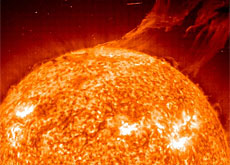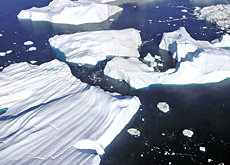Greenhouse sceptics confounded by solar study

The Sun's changing energy levels are not to blame for recent global warming, according to a study co-authored by a Swiss scientist.
Experts say the findings add to a growing body of evidence that human activity and not natural causes lies behind rising average world temperatures, which are this year expected to reach their second-highest level since records began in the 1860s.
If anything, solar variations over the past 20 years should have had a cooling effect, according to a paper published by British and Swiss researchers this week.
There is little doubt that solar variability has influenced the Earth’s climate in the past and may well have been a factor in the first half of the last century, but the scientists said it could not explain recent warming.
“Over the past 20 years, all the trends in the Sun that could have had an influence on the Earth’s climate have been in the opposite direction to that required to explain the observed rise in global mean temperatures,” they wrote in the Proceedings of the Royal Society.
Most scientists say emissions of greenhouse gases, mainly from burning fossil fuels in power plants, factories and cars, are the prime cause of the current warming trend.
A dwindling group pins the blame on natural variations in the climate system, or a gradual rise in the Sun’s energy output.
Confusion
To unpick that possible link, Mike Lockwood of Britain’s Rutherford Appleton Laboratory and Claus Fröhlich of the World Radiation Center in the Swiss mountain resort of Davos, studied factors that could have forced climate change in recent decades, including variations in total solar irradiance and cosmic rays.
The data was smoothed to take account of the 11-year sunspot cycle, which affects the amount of heat the Sun emits but does not affect the Earth’s surface air temperature, due to the way the oceans absorb and retain heat.
They concluded that the rapid rise in global mean temperatures seen since the late 1980s could not be ascribed to solar variability, whatever mechanism was invoked.
“I would say that from the point of view of the climate, the findings are very important,” Fröhlich told swissinfo.
Britain’s Royal Society – one of the world’s oldest scientific academies, founded in 1660 – said the new research was an important rebuff to climate change sceptics.
“At present there is a small minority which is seeking to deliberately confuse the public on the causes of climate change.
“They are often misrepresenting the science, when the reality is that the evidence is getting stronger every day,” it said in a statement.
UN climate panel
Stefan Rahmstorf, a climate scientist at the Postsdam Institute for Climate Impact Research in Germany, took a similar line in the science journal Nature.
“This paper is the final nail in the coffin for people who would like to make the Sun responsible for present global warming.”
Over the past 150 years the ten warmest have all been since 1990 and a United Nations climate panel, drawing on the work of 2,500 scientists, said this year it was “very likely” human activities were the main cause.
The Intergovernmental Panel on Climate Change (IPPC) summary report, which was published in February, concluded that greenhouse gases were about 13 times more responsible than solar changes for rising global temperatures.
The panel gave a “best estimate” that temperatures would rise 1.8 to 4.0 degrees Celsius this century.
swissinfo with agencies
In Feburary’s IPCC report scientists said it was “very likely” – or more than 90% probable – that global warming was man-made.
The report predicts a “best estimate” that temperatures will rise by 1.8-4°C in the 21st century, within a likely range from 1.1-6.4°C.
The study projects a rise in sea levels of 28-43cm in the 21st century – and said bigger gains could not be ruled out if ice sheets in Antarctica and Greenland thaw.
A UN climate panel said earlier this year that human activities were the main cause of global warming.
But a group of scientists at the Danish National Space Center criticised said its findings did not take into account the cosmic ray hypothesis.
They say that cosmic rays, which help clouds to form, are partially blocked by the Sun’s more intense magnetic field, leading to the Earth warming.

In compliance with the JTI standards
More: SWI swissinfo.ch certified by the Journalism Trust Initiative



You can find an overview of ongoing debates with our journalists here. Please join us!
If you want to start a conversation about a topic raised in this article or want to report factual errors, email us at english@swissinfo.ch.